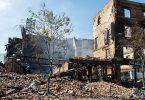Berrios property tax assessments for Cook County homeowners are flawed and unfair, study confirms

Cook County Assessor Joseph Berrios has been producing error-ridden property assessments that effectively punished poor homeowners while providing tax breaks to wealthy ones, according to a much-anticipated independent study of the county’s residential assessment practices.
The study, which reviewed assessments from 2014 to 2016, concluded that the county operates “a very regressive system” that causes “a wealth transfer from owners of lower-value homes to those of higher-value homes.”
County officials released the study Thursday to a handful of reporters before holding a small, closed-door briefing in the afternoon. The quiet release of the explosive report comes as Berrios, who is also chairman of the Cook County Democratic Party, faces a serious, well-funded primary challenge.
The study, conducted by an assessment expert from Virginia for the Civic Consulting Alliance, corroborates findings from the Chicago Tribune’s investigation “The Tax Divide,” which exposed widespread errors and inequities in residential assessments under Berrios from 2011 through 2015. It also counters months of assertions from Berrios’ office that his assessment process is sound.
Cook County Board President Toni Preckwinkle — a Berrios ally — commissioned the independent study of residential assessments the same morning Berrios and his staff insisted to county commissioners, in the aftermath of “The Tax Divide,” that the office produced fair and accurate assessments.
The report released Thursday found problems at every level of the assessment process, including the computer programs used to produce initial valuations. The study found those programs, known as regression models, produced values that are “outside the target range” of industry standards.
The problem of regressivity — the tendency to overvalue lower-priced homes and undervalue more expensive ones — is worse in Chicago than in the suburbs, the study concluded. In the city, the owner of a $600,000 home is likely to have an effective property tax rate that’s 24 percent lower than the rate for the owner of a $300,000 home, the report states.
More than 90 percent of the values created by the models are eventually changed by the assessor’s office before notices are sent to homeowners, according to the report. The opaque process, which includes something called “hand reviews,” allows the introduction of “systematic bias,” it found.
The office also engaged in “selective reappraisal” by modifying the valuations of properties that recently sold based on the sales price, according to the study. That practice, known in the field as “sales chasing,” violates industry standards. Illinois’ constitution also requires that assessors treat all properties in the same way.
Sales chasing not only introduces inequities into the system but also causes assessment systems to look better on paper than they are in reality, the report said.
Khang Trinh, director of legal counsel for the assessor’s office, said at the briefing: “Our office does not sales-chase.”
The assessor’s office has asserted for months that the county’s robust appeals system offers a remedy for any flawed property valuations that may be produced. But the new study concluded that assessments were even less fair after the appeals process was complete.
“The levels of appeals in Cook County are very high and increase regressivity,” the study stated, with owners of homes worth more than $1 million twice as likely to appeal their assessments as those who own homes worth less than $500,000.
The study also noted the extent of work it will take to fix the problems.
“Bringing the system into compliance with industry standards will require fundamental changes in modeling, review processes, data collection and a shift away from reliance on appeals,” it states.
Preckwinkle, who made remarks at the start of Thursday’s briefing but left before reporters could ask questions, said she believed the new analysis had put the assessor’s office “on the right path.”
“Our goal, everyone’s goal, is a fair and equitable residential property tax system,” Preckwinkle said.
Now the county is faced with the task of figuring out how to put a new system in place without disrupting the collection of billions of dollars in property taxes that are used to fund everything from public schools to police and fire departments.
Since Preckwinkle ordered the study nearly seven months ago, bills have gone out to residents across Cook County, and work on the reassessment of Chicago’s 700,000-plus residential properties is expected to start in June.
Although the study calls for swift action in developing a new valuation model and dramatically improving data collection, it does not lay out a time frame for when those measures should be completed.
For months, Berrios and his representatives have insisted the office produced fair and accurate assessments while dismissing findings from “The Tax Divide,” though without providing any evidence.
“The Cook County assessor’s office strongly disagrees with the Tribune’s opinion, because the study they used and the methods they advocate are unreliable,” Berrios said at a news conference held the day after the Tribune’s first story was published in the print newspaper.
In fact, the county-commissioned independent study used the same industry standards and methods featured in the Tribune series, all of which are set by the International Association of Assessing Officers and used by assessment experts around the world.
In the buildup to the report’s release, Preckwinkle has repeatedly characterized any flaws in the residential property tax system as problems that long predated her first election to her current office in 2010 — an assertion she repeated Thursday. Berrios was elected assessor the same year.
“It’s important to remember that the assessor and the Board of Review did not develop the system now in use,” Preckwinkle said earlier this month. “It’s something they inherited and it’s been in place for 40 years.”
Berrios voiced similar sentiments at the Thursday meeting.
“When I came into office, I took over a 40-year-old assessment system that needed improvements,” the assessor said. “My first priority was to make sure our tax bills went out on time, which had not happened in 34 years. Getting tax bills out on time saves taxpayers millions of dollars.”
However, the Tribune’s investigation documented how Berrios was aware of problems with residential assessments early on in his tenure, then failed to follow through on fixes.
Beginning in 2009, errors and regressivity in residential assessments spiked to levels not seen since at least 2003, the Tribune found.
Berrios’ predecessor, James Houlihan, turned to the MacArthur Foundation in 2009 for help in developing a new model to improve accuracy and reduce regressivity. But that work stalled after Berrios took office late the following year.
And although Berrios announced in July 2015 that the office had adopted new, state-of-the-art computer models to improve assessment accuracy and address persistent inequities, the Tribune found that he did not implement that system as promised.
Confronted with those findings in September 2016, officials said the assessor’s office already produced accurate results and that a new valuation model wasn’t necessary. The office then began disparaging the model as problematic.
The assessor’s office continues to rely on outdated valuation methods and obsolete technology, the report released Thursday states.
One of the key recommendations of the new study is that office should run checks on its work — known as sales ratio studies — before sending assessment notices to the county’s 1.4 million residential homeowners, as is standard practice in the industry.
Had it done so previously, the office would have known that its assessments were rife with errors and deeply unfair.
At the briefing, Berrios said he was prepared to follow recommendations for improving assessments.
“I have made a commitment that I will change whatever needs to be changed,” Berrios said. “We need to make sure that everything is done properly across the board, and I am working … to make sure that all of these inequities are taken care of to the best of our abilities.”
In December, ProPublica Illinois and the Tribune collaborated on a story that found the accuracy and fairness of assessments for commercial and industrial properties were even worse than for residential properties, with skyscrapers getting massive tax breaks while small businesses were overvalued.
Because commercial and industrial properties represent nearly a third of the county’s total property tax base, flaws in those assessments can cause the tax burden to shift in ways that are detrimental to homeowners and small businesses.
The new study did not address commercial and industrial assessments, and Preckwinkle has said any examination of the assessor’s work on commercial and industrial properties will have to wait.
“We’re focused on residential — one thing at a time,” Preckwinkle said at the recent news conference. “We’ve got to address the residential assessments for the next three triennials before we proceed to other parts of the property taxation system.”
The initial scope of the study was to assess transparency at the assessor’s office. That part of the study was not completed at the time of its release. The report did call on the assessor’s office to publish its sales ratio studies as they are completed.
The assessor’s office has touted its appeals system as evidence of its commitment to fairness. But the new study found the appeals process made inequities worse.
Those results mirror what the Tribune reported in June, after examining appeals in partnership with the University of Chicago’s Center for Municipal Finance.
Although anyone can file an appeal, that analysis found owners of high-priced homes were more likely to do so. Those homeowners also often won reductions, even though the assessor’s office has tended to undervalue more expensive properties. Those trends mean that an already unfair system became even less equitable after the appeals process was complete.
The assessor’s failures have led to calls for change and exposed the county to litigation. In December, three prominent public interest law firms sued the county and Berrios in Cook County Circuit Court alleging violations of state and federal civil rights and housing laws.
Drawing heavily on “The Tax Divide,” the suit contends the county’s “residential property tax scheme is neither accurate nor uniform” and is “perpetuating institutional racism” by shifting the tax burden from wealthier, majority-white neighborhoods to poorer, minority neighborhoods.
The issue also is playing out in the political arena. In March, Berrios faces a Democratic primary challenge from asset manager Fritz Kaegi, who has vowed to address the inequities in the system.
“Today’s CCA report is the latest in a mountain of expert analysis that over the years all point to one indisputable conclusion: Assessor Berrios has failed the taxpayers of Cook County,” Kaegi said in a statement after the report’s release.
A second-would be challenger, property tax consultant Andrea Raila, was knocked off the ballot Thursday by the Cook County Electoral Board, though she has vowed to appeal that decision to the Circuit Court.
Cook County Commissioner Larry Suffredin gave Berrios and Preckwinkle credit for releasing the study now, since they both could face heat over the issue in the March 20 primary. But he said Berrios should have addressed problems with assessments sooner.
“If he just got elected last month, he’d have a defense,” said Suffredin, an Evanston Democrat.
Commissioner Richard Boykin, an Oak Park Democrat, also criticized Berrios, saying no further studies were needed and the CCA effort was a stalling tactic.
“I respect Assessor Joe Berrios, but I wish he would have simply faced these problems head-on,” Boykin said in a statement. “The time to deal with this problem was a long time ago. If the wealthy do not pay their fair share, the burden is shifted to those who can least afford it. And that is a travesty.”
This report is a collaboration between the Chicago Tribune and ProPublica Illinois, an independent, nonprofit journalism organization.
hdardick@chicagotribune.com
RELATED
I knew Paul Bauer, and he was as wonderful as people are saying
2 days ago on 2/15/2018







